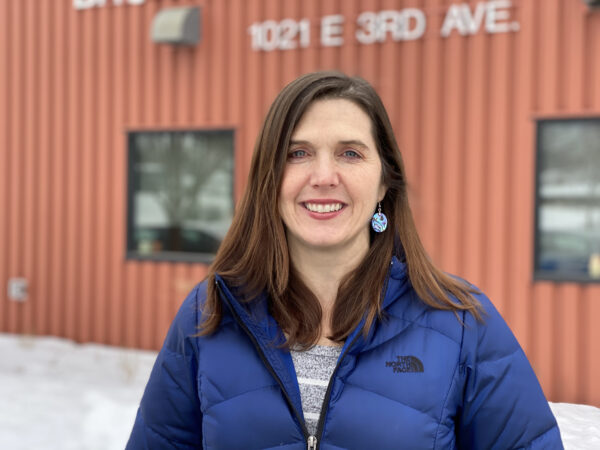
Amid a slew of resignations and firings among those involved in Anchorage’s response to homelessness, the head of one of the state’s largest social service organizations, also focused on homelessness in the city, has left her job, too.
Catholic Social Services Executive Director Lisa Aquino was with the organization for seven years and oversaw the Brother Francis Shelter, among other services, including a refugee resettlement program.
Brother Francis had been Anchorage’s largest shelter until the coronavirus pandemic hit and the city turned the Sullivan Arena into an emergency shelter.
Aquino says there are still many questions about the shelter at the Sullivan and, in general, about how the city interacts with its unsheltered residents. But Aquino says what’s clear is that the need for shelter and long-term housing continually increased during her time with Catholic Social Services.
Listen here:
[Sign up for Alaska Public Media’s daily newsletter to get our top stories delivered to your inbox.]
The following transcript has been lightly edited for clarity.
Lisa Aquino: What we saw were some pretty dramatic increases between 2005 and 2015. We saw a 30% increase in the number of people, adults, coming into us at Brother Francis Shelter. So we saw this increase. And first and foremost, it was looking at our services and adjusting our services to meet the needs of our clients then. But I think we really felt like we needed to sound the alarm. And we did. And we brought attention to the fact that there was really no resources coming into the services from the municipality at that point. The muni was doing almost nothing around homeless services. And so, you know, in that vacuum, I think that everybody was looking to point fingers at whose fault that was. And I think it wasn’t anyone’s fault. It was the fact that there was an increase in people without shelter, and we didn’t have enough services to provide.
Casey Grove: That makes sense, that it’s hard to just sort of point at one thing. But has the Municipality of Anchorage done enough to help? I mean, is it contributing enough toward this response?
LA: Well, I mean, I think that’s an ongoing conversation as the ground shifts underneath us, right? I mean, COVID shifted the ground dramatically. And previous to that there was the earthquake, and then there’s state budget cuts. And we’ve all worked hard to be collaborative and transparent. Some of the things I’m most proud of are the partnerships that we’ve built. And then those have set us up for some success now. You know, I’m really hopeful about the conversations that have been happening between the administration and the Assembly now, and the shared goals and the shared sense of responsibility to address this issue.
CG: It seems like there was a plan on the table, at least, with the previous mayoral administration, which would have been Austin Quinn-Davidson, to buy some properties and set up some smaller shelters. And that was nixed by the incoming Bronson administration. Has it been frustrating in any way to see that kind of back and forth? And to be, in some ways, still in the same situation of a large homeless shelter at the Sullivan Arena and an uncertain future?
LA: Yeah, it is. Yeah, it is uncertain. And that’s why it’s so important that we all keep advocating for the people experiencing homelessness and their need for safe shelter. You know, just to keep in mind, that it’s only been in the past six years that the local government has really been talking about this at the level that they are talking about it. And it’s only been really since the threatened state budget cuts and then COVID that the municipality has made a big investment in any of these services. So they haven’t figured out how to do it yet. And that’s a relatively short time. Now, that doesn’t mean that they shouldn’t feel the urgency to figure it out. They should. Because these are people’s lives at stake.
CG: One thing I wanted to ask you, just kind of stepping back from some of those issues, is just in general, do you think that there is kind of a broader misunderstanding about the difference between visible homelessness and folks that people may see out on the street that are experiencing mental health issues or substance misuse issues and then everyone, all together, that is experiencing homelessness that may not be as visible?
LA: In my time at Catholic Social Services, where I’ve learned the most is in actually meeting people experiencing homelessness and talking to them and hearing about their experience. And I think it’s really important that people understand that most people who are experiencing homelessness, it is acute, it is for a specific, short-term reason that they found themselves without housing. They lost their job. They had a medical bill that was very expensive, and they couldn’t afford to pay the rent and the bill. Their car broke down. They’re experiencing some kind of domestic violence in their home and they had to leave. They need some help. They need some safety. And they’re going to be able to get back into some kind of a housing situation with a little bit of help and support. There’s so many people that are like that. And unfortunately, so many of our neighbors here in Anchorage are living so close to the edge in terms of their own financial situation, that one thing like that is going to push them into homelessness.
Casey Grove is host of Alaska News Nightly, a general assignment reporter and an editor at Alaska Public Media. Reach him at cgrove@alaskapublic.org. Read more about Casey here.





